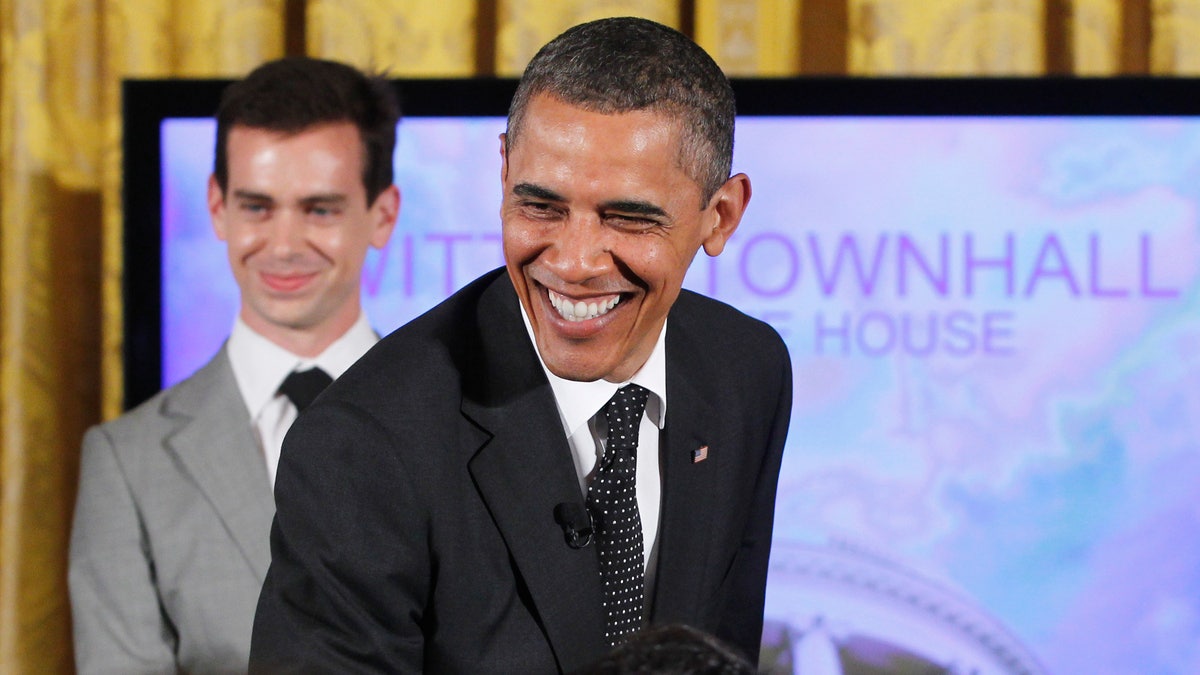
President Obama used a gun metaphor to describe debt talks with Republicans during a Twitter Town Hall in the East Room of the White House in Washington, Wednesday, July 6, 2011. (AP2011)
Six months after the nation's leaders called for a more civil discourse following the mass shooting tragedy in Arizona, politicians in both parties have struggled to avoid using violent or overheated rhetoric.
Just this week, as the White House and Congress engaged in high-stakes negotiations over raising the nation's borrowing limit while reducing the deficit, President Obama said the debt ceiling should not "be used as a gun against the heads of American people to extract tax breaks for corporate jet owners or oil and gas companies that are making billions of dollars."
It was Obama in January who urged Americans to tone down the rhetoric at a memorial service in Tucson for the six killed and 13 wounded in the shooting, including Rep. Gabrielle Giffords.
"At a time when our discourse has become so sharply polarized, at a time when we are far too eager to lay blame for all that ails the world at the feet of those who think differently than we do," he said, "it's important for us to pause for a moment and make sure that we are talking with each other in a way that heals, not a way that wounds."
A string of comments since that speech, from the president and many others, demonstrates that officials still have a long way to go to heed that call:
-- On the same day as the memorial service, Sarah Palin drew sharp criticism for accusing journalists and pundits of "blood libel," a historical reference to Jews being accused of kidnapping and murdering Christian children to obtain their blood for religious rituals.
Palin said she used the term to describe comments by those who falsely tried to link her to the assassination attempt against Giffords.
-- Weeks after Obama's speech, Rep. Steve Cohen, D-Tenn., compared Republican attacks on the health care overhaul to Nazi propaganda advanced by Joseph Goebbels.
"They don't like the truth so they summarily dismiss it," Cohen said to a mostly empty chamber on the House floor. "They say it's a government takeover of health care, a big lie just like (Nazi propagandist Joseph) Goebbels."
Cohen, who is Jewish, expressed regret that anyone was offended but stood by his remarks in the face of fierce criticism from Jewish groups.
-- In February, a Republican lawmaker drew criticism for not rebuking a constituent at a town hall meeting when he asked, "Who's going to shoot Obama?"
Instead, Rep. Paul Broun said he understood the frustration with Obama and reminded his audience that they would have the chance to help elect a new president next year. After the exchange was reported by local media, Broun issued a statement calling the question "abhorrent" and saying he chose not to dignify it with an answer. Broun also said he alerted the Secret Service.
-- In the same month, Rep. Michael Capuano, D-Mass., told a Boston crowd protesting Wisconsin Gov. Scott Walker's proposal to weaken collective bargaining rights that union members should "get a little bloody."
"I'm proud to be here with people who understand that it's more than just sending an email to get you going," he said. "Every once and awhile you need to get out on the streets and get a little bloody when necessary."
Capuano later apologized.
Despite the apologies, the acrimonious budget talks between Republicans and Democrats have since opened the door to even more over-the-top rhetoric.
-- In March, Sen. Chuck Schumer, the No. 3 Democrat in the Senate, was overhead on a conference call telling his colleagues that they should all use the word "extreme" to describe the deep spending cuts that Tea Party-backed Republicans were seeking "because that's what the caucus instructed me to do the other week."
-- In April, Rep. Louise Slaughter, D-N.Y., told a crowd of abortion rights supporters that Republicans who who sought to defund Planned Parenthood want to "kill women."
She also compared the GOP proposal to the Nazi movement.
"You are allowed to have an abortion if you've been raped or it's a matter of incest. However, you have to keep a receipt," Slaughter said. "Did you know that? It's sort of like an old German Nazi movement: show me your papers."
-- And since Florida Rep. Debbie Wasserman-Schultz became head of the Democratic National Committee, she has ignited a storm of controversy over the language she has used to attack Republicans in her new position.
She has characterized Republicans policies as amounting to waging "a war on women." She said last month that Republican state proposals for voter ID requirements and limits on early voting proved that the GOP wants to "literally drag us all the way back to Jim Crow laws."
She walked back the Jim Crow reference but continues to accuse Republicans of trying to block access to the polls.
And she said the Republican plan to overhaul Medicare would, for people under 55, "throw you to the wolves."
-- For a few months, Donald Trump took his reputation for blunt talk to a new level as he flirted again with a presidential run. After relentlessly questioning whether Obama was born in the U.S. – which led the president to produce his detailed Hawaii birth certificate – Trump outdid himself during a speech in Las Vegan in which he unleashed an f-bomb-laced attack on Obama and Washington politics.
"Our leaders are stupid, they are stupid people," he said. "It's just very, very sad."
At one point, Trump told a woman who yelled out he should run for president that he thinks he's going to make her happy.
But later, he said, "There is a really good chance that I won't win because of one of these blood-sucking politicians."





















